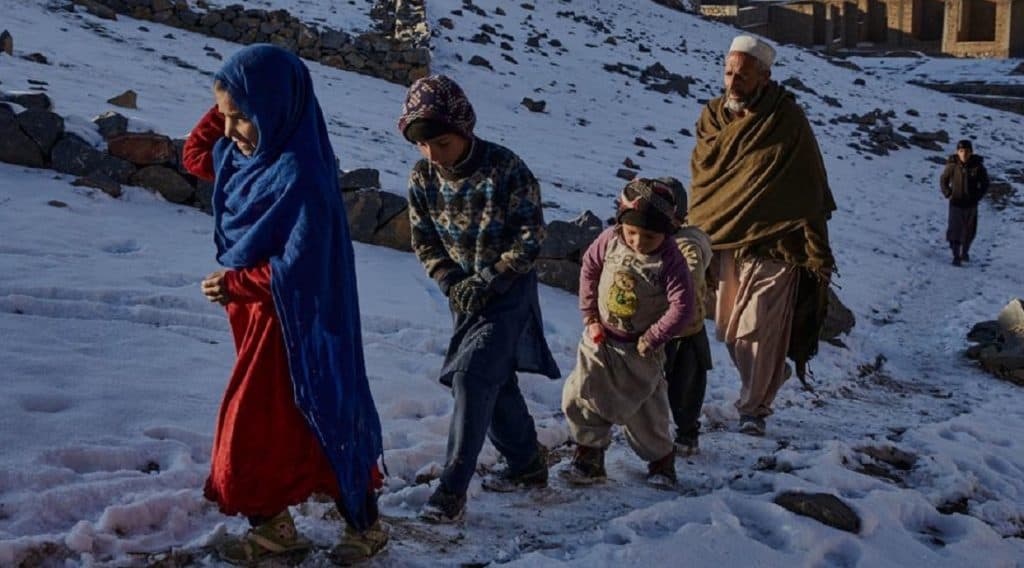By Prof. Engr. Zamir Ahmed Awan
UN aid chief Martin Griffiths appeals to the international community, saying ‘full-blown humanitarian catastrophe looms’ in Afghanistan. Around 22 million people, which constitutes almost half of the population of Afghanistan are facing grieve crises, like shortage of food, medicines, fuel, electricity, and basic necessities of life.
On 11 January 2022, the United Nations said it needed nearly $5bn in aid for Afghanistan in 2022, as the global body launched its largest-ever humanitarian appeal for a single country to avert a humanitarian catastrophe. The UN humanitarian agency on Tuesday said $4.4bn was needed within Afghanistan, while a further $623m was required to support the millions of Afghans sheltering beyond its borders. Approximately 5.7 million displaced Afghans in five neighboring countries needed vital relief this year. Pakistan has been hosting Afghan refugees for four decades, the number of Afghan refugees touched up to 5 million at peak time, and however, currently, there are roughly 3 million.
“A full-blown humanitarian catastrophe looms. My message is urgent: don’t shut the door on the people of Afghanistan,” said UN Humanitarian Affairs and Emergency Relief Coordinator Martin Griffiths. “Help us scale up and stave off widespread hunger, disease, malnutrition, and ultimately death.”
Since the Taliban regained control of Afghanistan last August, after the hap-hazard and ill-planned withdrawal of US and NATO troops, the country has plunged into financial chaos, with inflation and unemployment surging after Washington froze billions of dollars of the country’s assets and international financial institutions suspended funds. Moreover, aid supplies have been heavily disrupted due to US sanctions. The hard winter has further increased the suffering of the people. Afghanistan also suffered its worst drought in decades in 2021. Without the aid package, “there won’t be a future”, Griffiths told reporters in Geneva.
In response to the UN appeal, the United States promised more than $308 million in an initial aid package for Afghanistan this year. The money will provide for food and nutrition for vulnerable people, health care facilities, winterization programs, and logistics support, the United States Agency for International Development (USAID) said in a statement.
Speaking from Kabul, UNICEF chief of communications Sam Mort said that “Afghanistan was descending into the biggest humanitarian crisis in the world. The scale of suffering is unprecedented. “Without action, one in two children will be acutely malnourished. On top of that, Afghanistan is experiencing the worst drought in 27 years, rising food poverty, and unemployment. All of this has been in the background during winter,” she added.
OIC’s extraordinary meeting in Islamabad on the Afghan issue has made some positive decisions, but, not fully materialized yet. Time is running quickly and the situation on the ground is getting more serious with the passage of every day.
Griffiths said the appeal, if funded, would help aid agencies ramp up the delivery of food and agriculture support, health services, malnutrition treatment, emergency shelters, access to water and sanitation, protection, and education.
An estimated 4.7 million people will suffer from acute malnutrition in 2022, including 1.1 million children with severe acute malnutrition.
Griffiths said without humanitarian aid, distress, deaths, hunger and further mass displacement would follow, “robbing the people of Afghanistan of the hope that their country will be their home and support, now and in the near term”.
However, if international donors come forward, “we will see the opportunity for an Afghanistan which may finally see the fruits of some kind of security”.
Griffiths said the security situation for humanitarian organizations in Afghanistan was probably much better now than for many years, adding that the staff in the ministries in Kabul largely remained the same as before the Taliban takeover.
He said the UN Security Council’s move in December to help humanitarian aid reach desperate Afghans, without violating international sanctions aimed at isolating the Taliban, had made the operating environment for donors and humanitarians on the ground much more comfortable.
The money will go to 160 NGOs plus UN agencies delivering aid. Some will be used to pay front-line workers such as healthcare staff.
About eight million children could miss out on their education because teachers largely have not been paid since August, Griffiths said.
UN refugee chief Filippo Grandi said the aid package’s goal was to stabilize the situation within Afghanistan, including for internally displaced people, thereby preventing a further flood of migrants fleeing across the country’s borders. “That movement of people will be difficult to manage, in the region and beyond because it will not stop in the region,” he said. It is worth mentioning that if timely actions are not taken, the situation might worsen further, “we will have to ask for $10bn next year, not $5bn,” he added.
Few countries including Pakistan are extending humanitarian assistance, but, having their own limitations of resources, are not sufficient. The UN’s appeal to the international community may act on a priority basis to approach the starving humanity in Afghanistan proactively.
Author: Prof. Engr. Zamir Ahmed Awan – Sinologist (ex-Diplomat), Editor, Analyst, Non-Resident Fellow of CCG (Center for China and Globalization), National University of Sciences and Technology (NUST), Islamabad, Pakistan.
(The views and opinions expressed in this article are only of the authors and do not necessarily reflect the views, opinion or position of World Geostrategic Insights).
Image Credit: UNHCR/Andrew McConnell







